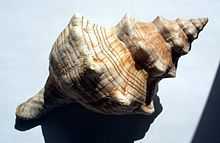Pleuroploca trapezium
| Pleuroploca trapezium | |
|---|---|
| | |
| Pleuroploca trapezium | |
| Scientific classification | |
| Kingdom: | Animalia |
| Phylum: | Mollusca |
| Class: | Gastropoda |
| (unranked): | clade Caenogastropoda clade Hypsogastropoda clade Neogastropoda |
| Superfamily: | Buccinoidea |
| Family: | Fasciolariidae |
| Genus: | Pleuroploca |
| Species: | P. trapezium |
| Binomial name | |
| Pleuroploca trapezium (Linnaeus, 1758) | |
| Synonyms[1] | |
| |
Pleuroploca trapezium, common name : the trapezium horse conch, is a species of sea snail, a marine gastropod mollusk in the family Fasciolariidae, the spindle snails, the tulip snails and their allies.[1]
This species is sought after for food but also to be used as a trumpet when the tip of the spire is cut off.[2][3]
Subspecies and formae
- Subspecies Pleuroploca trapezium audouini (Jonas, 1846)
- Forma Pleuroploca trapezium f. intermedia (Kobelt, 1875)
- Forma Pleuroploca trapezium f. paeteli (Strebel, 1911)
Description
The golden brown shell is solid and heavy. Its shell size varies between 85 mm and 250 mm with a common length of 200 mm. The spire is of moderate length. The apex is usually eroded. The sutures are constricted. The shoulders on the whorls are covered with spiral rows of slightly pointed strong nodules. The surface is covered with fine, brown, incised spiral lines, mainly in pairs. The outer lip is dentate with seven pairs of teeth, situated where the paired lines meet the edge. The oval aperture is pale with strong ridges internally. The columella is smooth posteriorly. The siphonal canal is extended and short. The fasciole is weak.[1]
Pleuroploca trapezium has been observed preying on the spiny cerith (Cerithium echinatum) in the Seychelles.[4]

Distribution
This species is distributed in the Red Sea and in the Indian Ocean along Aldabra, Madagascar, Mauritius, Mozambique, Réunion, South Africa and Tanzania; in the Pacific Ocean from Japan down to Melanesia, New Caledonia and North Queensland but rarely along Australian coasts.
Habitat
This species can be found in the benthic zone on seagrass beds at depths between 0 - 40 m.
References
- ↑ 1.0 1.1 1.2 Pleuroploca trapezium (Linnaeus, 1758). Retrieved through: World Register of Marine Species on 18 April 2010.
- ↑ Sealifebase : Pleuroploca trapezium; accessed : 24 November 2010
- ↑ Felicia Shanthini and Jamila Patterson, Processing of horse conch, Pleuroploca trapezium, (Fasciolariidae) meat into meat balls; Asian Fisheries Science 18 (2005): 265-273.
- ↑ Richard (Joseph R.) Houbrick, Growth Studies on the Genus Ceirhium (Gastropoda: Prosobranchia) with notes on ecology and microhabitats; The Nautilus, vol 88, 1, January 1974.
Further reading
- Dautzenberg, Ph. (1929). Mollusques testaces marins de Madagascar. Faune des Colonies Francaises, Tome III
- Richmond, M. (Ed.) (1997). A guide to the seashores of Eastern Africa and the Western Indian Ocean islands. Sida/Department for Research Cooperation, SAREC: Stockholm, Sweden. ISBN 91-630-4594-X. 448 pp.
External links
| Wikimedia Commons has media related to Pleuroploca trapezium. |